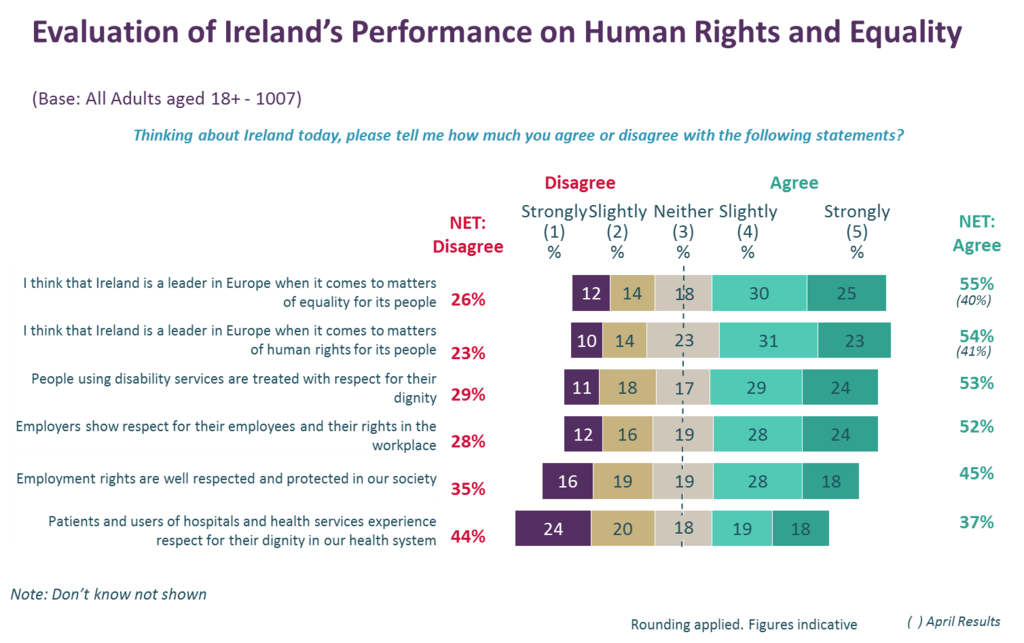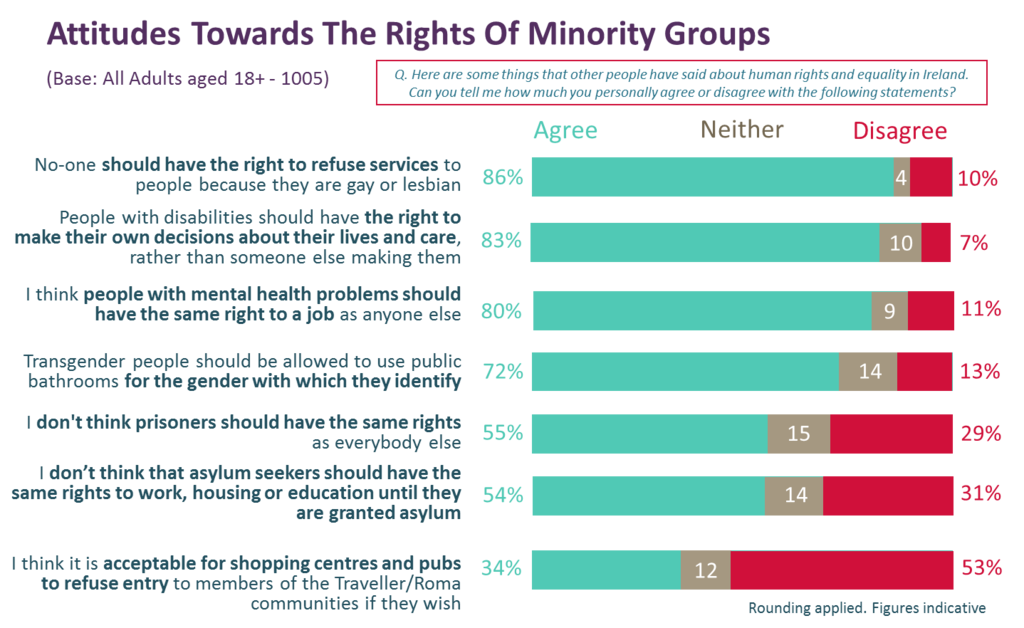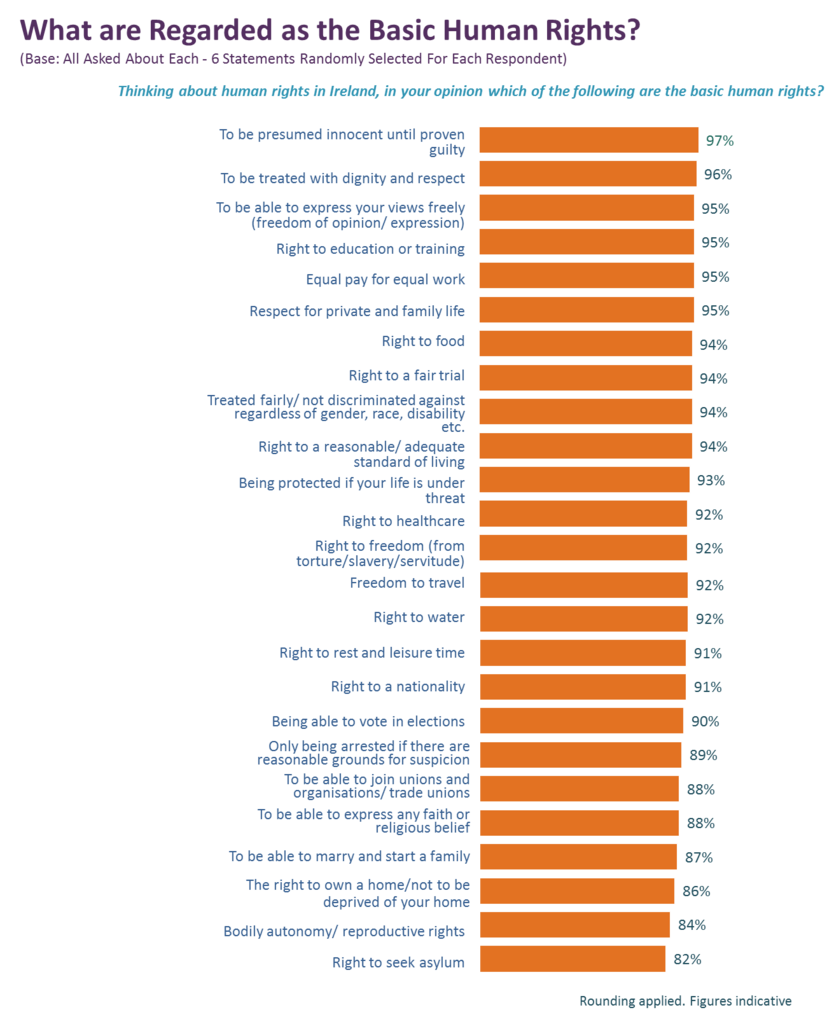Marriage Equality Referendum changes perception of Ireland as a leader in Europe on human rights and equality
- Red C Poll published by Irish Human Rights and Equality Commission (IHREC)
- Ireland viewed as leader on human rights after Marriage Equality Referendum
- 79 per cent believe Ireland has more to do in protecting human rights and equality
The proportion of people who think that Ireland is a leader in Europe on human rights and equality rose by 15 percentage points after the Marriage Equality referendum was held, according to a Red C poll published today by the Irish Human Rights and Equality Commission (IHREC).
In April, shortly before the Marriage Equality referendum took place, 41 per cent and 40 per cent respectively viewed Ireland as a leader in Europe in matters of human rights and equality for its people.
After the referendum these figures increased to 54 per cent and 55 per cent respectively, based on a follow-up poll conducted in June by Red C. The uplift came on the back of the high profile marriage referendum which took place in May.
A large majority of those polled, 79 per cent, believe we still have more to do when it comes to protecting human rights and equality in Ireland.
A total of 96 per cent believe that laws protecting human rights are important in order to create a fairer, more equal society, while 93 per cent care deeply about making Ireland a fairer place in which to live.
Health care concerns
However, the Red C poll commissioned by the IHREC indicates concerns that human rights are not respected within the health care system.
More people (44 per cent) believe that patients and users of hospitals and health services do not experience respect for their dignity, compared to those who do (37 per cent).
Opinion is sharply divided on a person’s ability to achieve their potential in our society, with 35 per cent believing that prejudice, discrimination or neglect limits potential, compared to 38 per cent who believe it does not.
Women are more likely to agree that people’s potential may be limited by discrimination.
Chief Commissioner Emily Logan said: “Irish people have a strong engagement with human rights and equality. This poll highlights the role of public discussion during the Marriage Equality referendum in raising awareness.”
“The vast majority of people care deeply about making Ireland a fairer place in which to live, but those aspirations are not always realised. This survey shines a spotlight on the public’s concern that patients and vulnerable groups are not being treated with dignity in the health care system.”
Ms Logan added that “all health care providers have a positive duty to respect the dignity, and to promote and protect the rights of those using services, including people with disabilities. The Commission has a role to play in educating and raising awareness in the public sector about this positive duty.”
A total of 29 per cent of those polled believe people using disability services are not treated with respect for their dignity, while 53 per cent believe they are.
Minority Rights
Half of the respondents, in particular younger people, believe that minority rights are not respected. Just over a quarter of those polled (27 per cent) believe that members of the Traveller community and immigrant communities are respected in Ireland, compared to 51 per cent who believe they are not.
There is broad support for the principle of human rights and equality, and for the protection of minorities. For instance, some 86 per cent of people believe that no one should have the right to refuse services to people because they are gay or lesbian.
A total of 96 per cent believe that no matter who you are or where you come from, you should be treated equally.
However, there appears to be some contrasting views in respect of the protections afforded to Travellers. In total, 53 per cent said it is unacceptable for shopping centres and pubs to refuse entry to members of the Traveller or Roma community, while 34 per cent of people believe it acceptable.
Ms Logan said: “The vast majority of people want to live in a country that is inclusive and respects everyone’s dignity, yet these hopes can only be realised by tackling discrimination and raising awareness about prejudice in all its forms.”
A total of 54 per cent of people do not think that asylum seekers should have the right to work, housing or education until they are granted status, compared to 31 per cent who do. Similarly, 55 per cent do not think prisoners should have the same rights as everybody else compared to 29 per cent who do.
Ms Logan noted: “Ireland is one of the few jurisdictions in the EU that does not allow asylum seekers the right to work and to make a meaningful contribution to society, even after years in the system. These limitations which are imposed by the State itself can ultimately influence public perceptions of asylum seeker rights.”
When asked who should support action to protect human rights and equality in society, the vast majority believe employers, schools, colleges and our education system have a key role (96 per cent), followed at 94 per cent by public bodies, such as the Irish Human Rights and Equality Commission, the justice system, the courts and An Garda Siochána.
The Employment Equality Act is most identified by people (83 per cent) as protecting their rights, followed by the European Convention on Human Rights (76 per cent); the Irish Constitution (73 per cent) and the Equal Status Act (61 per cent).
Click here for Awareness and Attitudes to Human Rights and Equality Poll conducted by Red C http://www.ihrec.ie/download/pdf/ihrec_awareness_and_attitudes_research_2015.pdf
Ends
For further information please contact Niamh Connolly/Fidelma Joyce on IHREC 01 8589601/ 087 4399022. Twitter: follow us @_ihrec
Slide 1.

Slide 2.

Slide 3.

Notes for Editors:
Red C research was conducted between 2nd and 8th April 2015. 1,005 adults aged 18+ were interviewed over the telephone. Follow up research was conducted between 22nd and 24th June. The sample size was quota controlled by age, gender, socio-economic status and region in order to ensure a fully representative sample. In addition, Red C Express uses a Random Digit Dial (RDD) method across landline and mobile to ensure that ex-directory households or those with no landline are included in the sample. The margin of error on a sample size of 1,000 is +/- 3 %.
The Irish Human Rights and Equality Commission (IHREC) was established by the Irish Human Rights and Equality Commission Act 2014. The Commission has a statutory remit to protect and promote human rights and equality in the State, to promote a culture of respect for human rights, equality and intercultural understanding and to promote understanding and awareness of the importance of human rights and equality. The IHREC is tasked with reviewing the adequacy and effectiveness of law, policy and practice relating to the protection of human rights and equality and with making recommendations to Government on measures to strengthen, protect and uphold human rights and equality accordingly